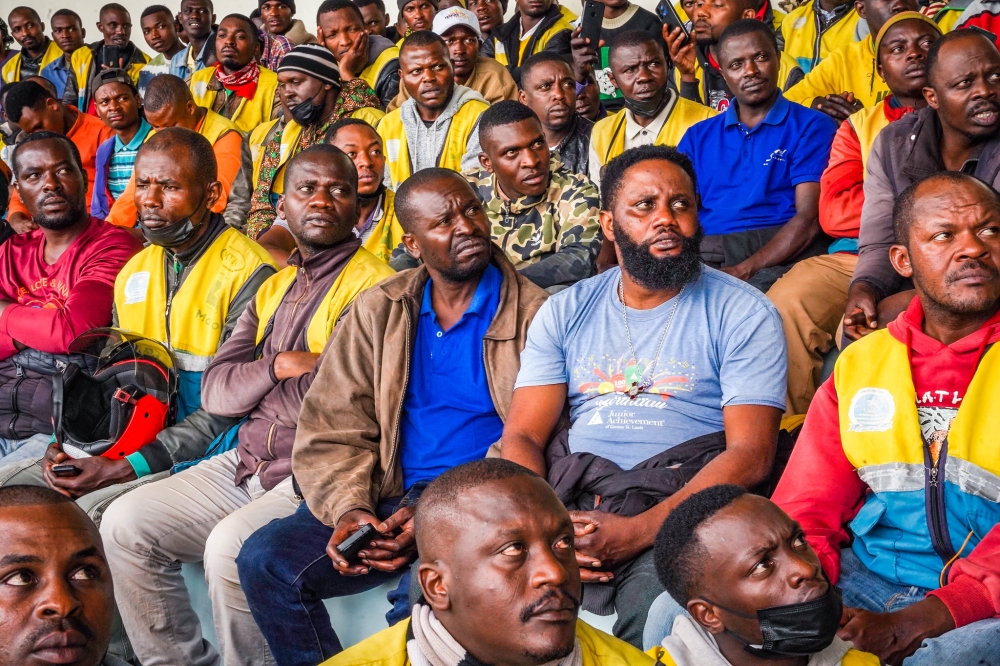

Isaie Niyitanga, a motorcycle taxi operator in Kigali, pays Rwf180,000 in insurance premiums per year for his motorbike that was manufactured five years ago.
However, he fears that by December 2024, when his motorbike surpasses five years, his premium will rise to Rwf230,000.
"Insurance premiums are soaring. It [gradually] increased from Rwf40,000 in 2017/2018 to Rwf180,000 currently (for a motorcycle that is not more than five-years old),” he said.
His motorbike is covered by insurance firm Radiant, which is considered the largest insurer of such vehicles in Rwanda.
Insurance companies attribute the rise in premiums to relatively high risks associated with motorcycles as well as the subsequent compensations to victims.
But motorcycle taxi operators argue that the situation is exaggerated, describing insurers’ pricing as unfair to them.


"[Owners] of motorbikes involved in accidents are often not compensated by insurance companies because they argue that motorcycle taxi operators are in the wrong,” Niyitanga said.
Also, he said, the accidents involving motorcycles implicate cars, but often the former are to blame, unfairly, pointing to an existing stereotype that ‘abamotari n’ubundi bagenda nabi’ – which loosely means motorcycle taxi operators drive recklessly.
"I have been driving a motorcycle for five years, but I have never caused an accident,” he said, calling for the reduction of motorcycle insurance premiums, and decrying a situation where such premiums are higher than those paid for the cover of some cars that carry more people than motorbikes.
Desiré Safari, another motorcycle taxi-operator, has to pay Rwf180,000 for his three-year old motorcycle – but he said he incurs Rwf190,000 to settle it up through instalment arrangement as he cannot afford a single payment.
Generally, he said, insurers are reluctant to provide motorcycle cover, with the reason they put forward being the reported high motorbike involvement in accidents.
He told The New Times he has been a motorcycle taxi operator for five years, but never been involved in an accident that required compensation from his insurer.
For him, the high insurance amounts, coupled with other expenses including income tax payment and fuel costs, undermines the profitability of a motorcycle taxi operator.
"Insurance reduction should be considered to offer a relief to motorcycle taxi operators,” he said, also questioning insurers’ rates for motorbikes that are in some cases higher than those for cars.
The Deputy Managing Director of Radiant, Ovia Kamanzi Tuhairwe, told The New Times that the increasing motorcycle insurance premiums result from the high number of accidents in which they get involved in.
"It is because of many accidents that make us incur excessive expenses on compensation that are beyond our capacity,” she said, adding that this is a common issue for all insurance companies.
Charlotte Kamanzi, Chief Commercial Officer, and acting CEO of SONARWA General Insurance, also said the high motorbike insurance premiums issue is common on the market, pointing out that it stems from high accident rates among motorcycle drivers.
"There are many accidents, and we think reducing them requires continuously teaching them [motorcycle taxi drivers] how to drive carefully on the road,” she said.
The Spokesperson of Rwanda National Police, ACP Boniface Rutikanga, told The New Times that from January to August, 2024, "we recorded 3000 accidents, 57% of which were motorcycle accidents.”
Some motorcycles [taxi operators], he said, were driving without documents, including insurance certificates.
"During this period, at least 100 [people] sustained injuries and 150 property damages that would need insurance compensation,” he observed, indicating that properties in question include motorcycles, cars, and infrastructure like electrical poles.
ALSO READ: Minister Nsabimana blames low motor-cycle insurance cover on high premiums
Regarding compensations, Radiant’s Tuhairwe said the claims ratio of each insurance product – such as for motorcycle, fire, and health cover among others – should not exceed 60 per cent of the collected premiums.
Claims ratio is the percentage of claims costs incurred (compensations paid) in relation to the premiums earned.
"But you realise that the claims ratio for motorcycles is very high; you find that we are at 120 per cent, while we should not exceed 60 per cent. Yet we are regulated companies, there is a regulator [the central bank] that sets such rates,” she said.
Such data suggests that Radiant’s expenses on compensations to motorcycle accident victims are 20 per cent higher than the premiums collected.
In 2021, Radiant paid more than Rwf2.9 billion for 3,561 cases (compensation claims), compared to Rwf3 billion for 4,470 cases in 2022, Rwf2.4 billion for 4,306 cases in 2023, and Rwf2.3 billion for 3,287 cases for the period up to September of 2024, according to statistics from the insurance firm.
The case for compensating victims in the informal sector
Tuhairwe said that expenses on compensations to victims of accidents involving motorcycles – under third party liability insurance coverage – are high, especially when the people in question are young.
This is the case because such compensations are based on the number of an affected person’s years up to the retirement age, which is 65.
She said a minimum amount of Rwf3,000 is considered daily when compensating an accident victim whose salary is not known – such as when they did not have a formal employment (lack an employment contract showing their salary), or were jobless – which means more than Rwf1 million per year.
The Rwf3,000 was set by the Supreme Court in a 2016 case ruling as the minimum amount of money to be generally considered the daily compensation for an accident victim. It was in response to a lack of minimum wage that considers market realities, in Rwanda’s legislation..
If the victim is 20, for instance, they have 45 years to the retirement age. This implies that they shall get Rwf45 million as compensation – even when they do not have a job.
She suggested such an amount should be reviewed, estimating that if it is revised downwards, it may somehow result in a reduction in motorcycle insurance premiums, accordingly.


